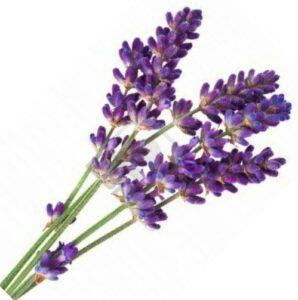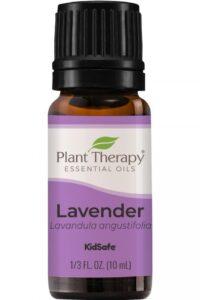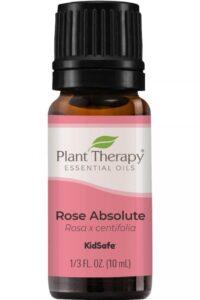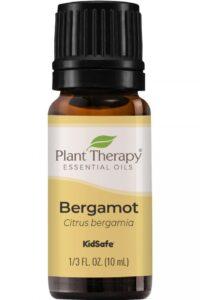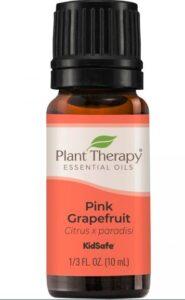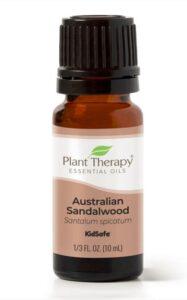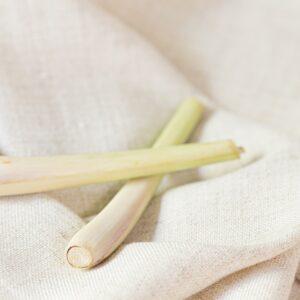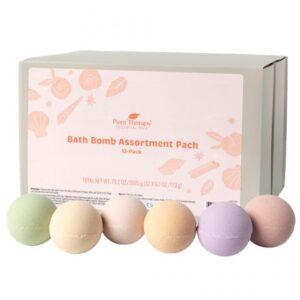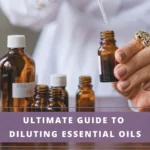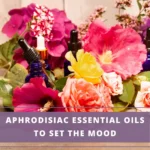As an Amazon Associate I earn from qualifying purchases. See Full Disclosure Here
If you’ve had one of those days where it seems like the stressors just kept on adding up, a relaxing bath can wipe the slate clean. It eases the stress away from your body and prepares you for a restful night’s sleep.
Using just a few drops of essential oil in the bath is enough to turn an ordinary bath into the ultimate relaxing spa session.
As you scroll down, you’ll find more details about:
1. Can you put essential oils in a bathtub?
2. How to use essential oils in the bath safely + 10 most important safety tips
2. The best essential oils to use in the bath
3. Easy DIY Recipes for a super luxurious spa session
4. Non-toxic premade Bath Soaks, Bombs, Salts, and other bath products including soothing Bubble Baths
Can You Put Essential Oils In A Bathtub?
It’s interesting to see people’s reactions when they hear about putting essential oils in a bathtub. ‘Can you put essential oils in a bathtub?’ That’s almost always the first question I’m asked.
So let’s get right to it – Yes, you can put essential oils in a bathtub. In fact, this is a great idea! Just a few drops of essential oil can enhance your time in the tub and elevate your at-home spa session.
The key however is to know how to add essential oils in the bathtub the right way. Before you put essential oils in your bathtub, it’s important to learn a few basic dos and don’ts and safety tips.
As you scroll below you’ll learn everything you need to know about adding essential oils to the bathtub the right way.
How To Use Essential Oils In The Bath Safely
Before talking about the best essential oils to use in the bath I want to talk about the safety aspect.
This is because essential oils are highly concentrated extracts and using them correctly in the bath is most important.
Using essential oils in the bath offers tremendous stress-relieving, muscle-relaxing, and mind-soothing benefits – but only if you do it right. The wrong techniques will not only not give you any of the benefits but it may cause skin irritation.
Once you’ve learned the basics of using essential oils in the bath and how to use them the right way, then you can have more fun learning about the best essential oils. Don’t forget to scroll right down to check out some fabulous essential oil-based bath products that enhance your at-home spa session.
10 Tips for Using Essential Oils in the Bath Safely & For Maximum Relaxation
 1. Never add essential oils directly into the bath
1. Never add essential oils directly into the bath
It may seem straightforward – you run a bath, put a few drops of your favorite essential oil, and get in, right? Wrong! The first and most important rule to remember is that you never ass essential oils directly into your bathwater.
Oil and water don’t mix. When you add essential oils directly into the water it will just float to the top. Even if you stir it in, it won’t blend with the water. It will simply form smaller droplets that still float around in the water.
When you climb into the tub, the small droplets of oil come in direct contact with your skin. This acts the same way as if you’ve applied undiluted oil directly to your skin. This can irritate or even burn sensitive skin.
Read any article on using essential oils safely and they all always emphasize that these oils should never be used on the skin directly in their concentrated form.
2. Always combine essential oils with a carrier oil first before adding to the bath
Just as essential oils must always be mixed with a carrier oil before topical application, the same rule applies to using essential oils in the bath.
When you mix essential oils with carrier oil, the two oils blend. When you add this mix to the bath, the carrier oil will float on top of the bathwater with the essential oil safely diluted in it. Your skin comes in contact with the diluted blend, which will not cause any irritation.
Carrier oils also help to moisturize the skin, which is an added benefit. I would always advise using the best quality carrier oil you can afford just as you would when buying a body lotion.
Coconut, Sweet Almond, Jojoba, Avocado, and Apricot Kernel are the best carrier oils to use with essential oils in a bath.
3. Use the right amount of essential oil and carrier oil in your bath
You need a maximum of 6 – 8 drops of essential oil in your bath. Don’t be tempted to add more before you like the aroma of the oil. With essential oils, more is not always better. A few drops (6-8) are all you need in your bath to get the benefits of the oil.
Mix your chosen essential oil with 15 ml or ½ oz of carrier oil and add the mix of oils into the water to create an aromatic, therapeutic bath.
Add the essential oil + carrier oil mix into the water and stir the water around to disperse the oils. After doing this, it’s time to step in.
4. Add the oils to the bath AFTER you’ve filled the tub and closed the faucet
Most people get this wrong when using essential oils in the bath. We are accustomed to putting in the bubble bath before opening the tap so that it works up a nice lather and assume that it’s the same with essential oils. It isn’t.
Essential oils are highly volatile. If you add the essential oil in the tub first and then open the faucet, the hot running water will cause the essential oils to evaporate into the air with the steam. That’s a waste of essential oil and you won’t get any of the benefits.
To get the maximum benefits of your aromatherapy bath, you must add the essential oil + carrier oil mix into the water AFTER you’ve filled the tub and closed the faucet.
Add the oil mix to the water and agitate the water so the oils disperse evenly in the water. Your essential oil bath is now ready for you to get in and relax.
5. Use only the highest quality essential oils
This is so very important for several different reasons. High-quality essential oils are extracted using advanced techniques that produce 100% pure oil. This ensures that you get the most from the oil’s therapeutic properties. Also, your skin will be coming in contact with the oil when you soak in the bath, even if indirectly. Using 100% pure essential oils takes away the risks of skin irritation.
Buying high-quality essential oils doesn’t necessarily mean looking for the most expensive brand out there. When you buy essential oils from a reputable company such as Plant Therapy or Barefut Oil, you’ll find that you get high quality at a reasonable price.
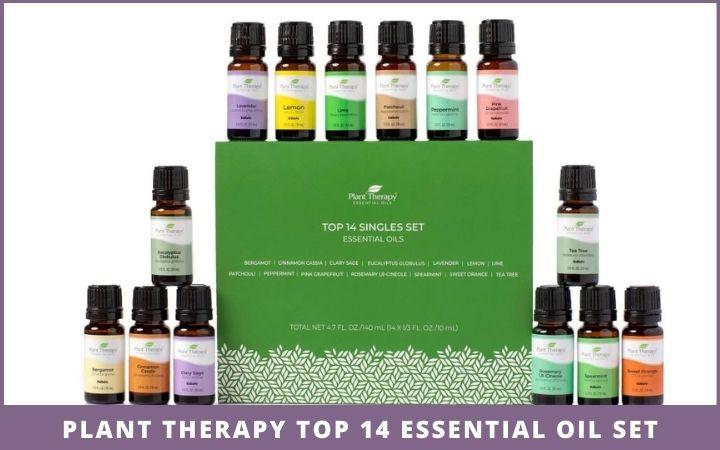 While buying their individual oils is a great value by itself, you’ll save even more when you buy one of their sets. When you buy an essential oil set, you get a variety of oils and synergies and you’ll pay less than what it costs to buy individual bottles of the same oil.
While buying their individual oils is a great value by itself, you’ll save even more when you buy one of their sets. When you buy an essential oil set, you get a variety of oils and synergies and you’ll pay less than what it costs to buy individual bottles of the same oil.
Plant Therapy’s Top 14 Essential Oil Set is my top choice, both for its quality and value for money. You get a nice selection of 100% pure, undiluted oils that you can choose from depending on your mood and needs.
The 7 x 7 Essential Oil Set includes an interesting combination of 7 single oils and 7 essential oil blends.
6. Avoid running a very hot bath
This ties in with tip #4. Very hot water will cause the essential oils to evaporate along with the steam so you won’t get the maximum benefits. Also, water that’s too hot is dehydrating and will leave your skin looking dry and flaky.
7. Be careful when using citrus oils in the bath
You will see a few citrus oils included in the list below. Citrus oils are popular additions to a bath because of their refreshing and reenergizing aroma. However, citrus oils can also cause photosensitivity.
If you do plan a spa session with citrus oils, avoid exposure to the sun for at least the next couple of hours.
8. Always read the instructions on the label
Every essential oil has its own distinctive features and precautions. If you are new to aromatherapy or this is the first time you are using essential oils in the bath, take time to read the instructions on the label. Make note of any precautions or special instructions mentioned on the label.
9. Watch out for a slippery tub
The amount of oil you use in the bath is not really enough to make it slippery but to be on the safe side, be extra careful when getting in. Put one foot in slowly and test the bottom of the tub to get a feel of whether it is slippery or not. You can never be too careful.
Finally, remember to clean the tub after your aromatherapy bath. The oils will cling to the side when you drain the water and that will create a slippery surface the next time you get in. A quick wash with baking soda and castile soap will suffice. Both of these are excellent de-greasers.
10. Avoid using these oils in your bath if you have sensitive skin
Avoid adding black pepper, clove, cinnamon, thyme, and basil oil to your bath if you have sensitive skin. These oils can irritate the skin and mucus membranes.
If you have very sensitive skin, you must consult your physician or dermatologist before using essential oils in the bath or even before using any skin care product containing essential oils.
Best Essential Oils to Use In The Bath For Relaxation
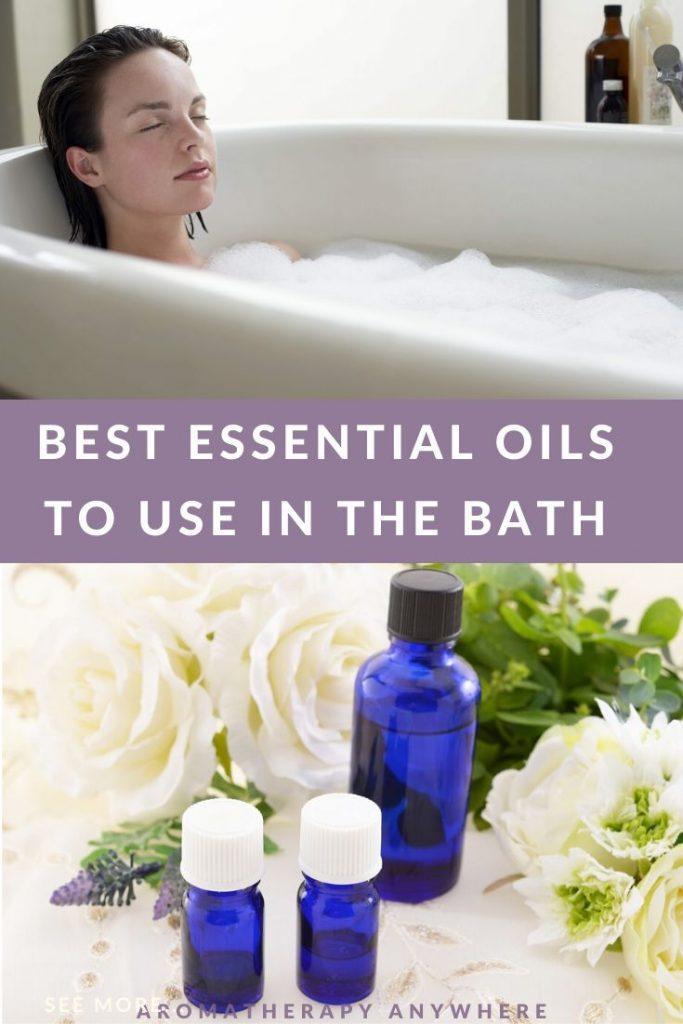 Now we’ve got the safety tips out of the way, it’s time to talk about the best essential oils to use in the bath.
Now we’ve got the safety tips out of the way, it’s time to talk about the best essential oils to use in the bath.
All essential oils are not appropriate to use in the bath. Very strong oils such as clove, cinnamon, oregano, and thyme can irritate the skin and mucous membranes. This is even with using a carrier oil.
No matter how much you love the scent of cinnamon, don’t be tempted to use this in your bath. This powerful oil may turn your tranquil tub time into a torture session.
The oils listed below are all mild, safe to use, smell heavenly, and are great for the skin too, which makes them the best essential oils to add to your bath.
Which essential oil should you use from the list? My advice is to pick the oil to match your bath-time mood.
Most of the essential oils to use in your bath belong to the floral or citrus aroma families. Learn more about Essential Oils & Their Aroma Families.
Lavender, Roman Chamomile, Rose, Ylang Ylang, Jasmine, Neroli, and Geranium belong to the floral aroma family.
Spearmint, Bergamot, Orange, Pink Grapefruit, and Lemongrass belong to the citrus family.
Want to make relaxing baths a regular thing? You can save money on essential oils by buying a set of oils instead of individual bottles. This Top 14 Essential Oil Singles Set by Plant Therapy offers the best value for money and includes several oils that you can use in your bath.
Lavender
If you want to buy only one oil for your bath sessions, choose lavender. Lavender is the quintessential bath oil for several reasons.
Lavender essential oil is soothing and calming, which is precisely what you need to turn your bath into a relaxing spa session. When added to the bath, lavender melts away your anxiety and stress. It is also great for easing stress-induced headaches and promoting better sleep.
In addition to all the stress-reduction benefits, lavender essential oil is also great for the skin. It soothes stressed, irritated or damaged skin, and is an excellent choice for those with sensitive skin.
Lavender is definitely one of the best essential oils to use in the bath for all the above reasons. It’s also why this is one of the most common ingredients in many popular bath products, from bath bombs and bath salts to bubble baths and body lotions.
You can take your relaxing bath up a notch by using Lavender Fine Essential Oil. Lavender Fine is steam distilled from a high-altitude plant variety with a short growing season. These specialized conditions produce a more refined, complex scent while retaining the calming and relaxing properties of lavender.
Lavender Fine is prized for its ability to help reduce the appearance of skin imperfections such as fine lines and dark spots and to soothe skin after excess sun exposure.
Roman Chamomile
Roman Chamomile is another essential oil well known for its gentle, calming properties. It combats feelings of anxiousness, worry, and anger, creating a wonderfully tension-reducing bath that encourages a good night’s sleep.
When the day’s events leave you feeling out of control, Roman Chamomile can help ease the tension and help you feel more relaxed.
Rose
Rose essential oil has a distinctly feminine scent that is evocative of decadent luxury. This is the perfect oil to use in your bath during a particularly rough day when you feel like you need a little extra pampering.
The aroma of rose essential oil is calming and gently uplifting. This scent works to soothe nervous tension and anxiety. You’ll feel calmer and more peaceful when you get out of your rose-scented bath.
Rose essential oil is also excellent for the skin. It supports all skin types, so even dry, sensitive skin will benefit from its restorative effects.
This is also one of the best aphrodisiac essential oils. Use it in your bath if you have any romantic plans for the night.
Combine 5 drops Rose, 2 drops Vanilla, and 1 drop Cardamom for a sensual bath blend. See the detailed recipe below.
Ylang Ylang
The relaxing properties of Ylang Ylang essential oil are well known. This floral essential oil is great for easing anxiety and boosting self-confidence.
Ylang ylang essential oil also has potent aphrodisiac properties and is a great choice for your bath if you have plans to stir up the passion in the bedroom.
Jasmine
The exotic aroma of jasmine essential oil is both soothing and uplifting. It helps to soothe your stress and anxiety while lifting your spirits and boosting your mood.
Jasmine essential oil is also super soothing for the skin. After your jasmine bath, slather this Intense Hydrating Shea Body Butter with Marula Oil & Jasmine Extract on your skin. Your skin will get the nourishment it needs while you drift off gently to sleep.
Geranium
Geranium essential oil is calming and relaxing. When you’re feeling overwhelmed and stressed, the gentle floral aroma can help to you feel calmer by easing your anxiety and tension.
Geranium is also great for the skin, which is a bonus when you add it to your bath. It helps balance out skin that is too oily or too dry. It also helps diminish wrinkles.
This is a great essential oil to use in your bath for its benefits both for stress relief and for the skin.
Bergamot
Bergamot belongs to the citrus aroma family. It has a lovely sweet-citrusy aroma that is part floral, part citrus. This is my go-to essential oil to use in the bath for those times when I don’t feel like going all-floral.
Bergamot essential oil has an uplifting, encouraging aroma that is calming and cheerful. It is great for relieving the stress of the day while also helping you feel uplifted and centered so you are better prepared to handle anything.
If you use bergamot essential oil in your bath, remember tip # 6 and its precautions about using citrus oils and going out in the sun.
Pink Grapefruit
Pink grapefruit essential oil has similar uplifting, calming, and cheerful properties as bergamot but it has a different aroma. Pink grapefruit essential oil has a mild citrusy aroma without the floral notes.
Using pink grapefruit essential oil in your bath will help you snap out of your funk and leave you feeling more energized and raring to get things done.
Sweet Orange
The balancing and uplifting properties of sweet orange essential oil make it perfect for use in the bath when you’re feeling down and need a lift-me-up. As you soak in the warm water, the aroma of orange oil will drain your cares away, leaving you feeling more cheerful and positive.
This is the best essential oil to add to your bath to banish the winter blues.
Frankincense

If you are a worrier and your persistent worrying is holding you back from doing the things you want, this is the oil you should use in your bath. Frankincense essential oil has a grounding aroma that is excellent for allaying unfounded fears and anxieties.
Using frankincense essential oil in your bath will erase your fears and instill creativity and inspiration. Creativity sans fear is exactly what you need to move forward and achieve everything you want to.
Sandalwood
This is another essential oil known for its grounding aroma that is calming and soothing but in a way that’s different from that of lavender. The aroma of sandalwood essential oil removes indecision and helps you stay more focused on your goals.
Sandalwood essential oil is also an excellent skincare oil. When added to your bath, it nourishes the skin while also focusing the mind.
Best Essential Oil to Use in the Bath to Soothe Sore Muscles & Ease Muscle Tension
Lemongrass
Lemongrass essential oil is well-known for its ability to soothe aching muscles and tendons. This is the best essential oil to use in your bath to relax the muscles after a rigorous physical workout or any vigorous activity. Lemongrass oil is also good for the skin.
Combine lemongrass, juniper, and lavender essential oils to create a powerful bath blend to soothe sore muscles. Scroll down to see the full recipe with the correct quantities of essential oils and carrier oil.
Best Essential Oil to Use in the Bath to Relieve Congestion & Stuffiness
Eucalyptus
Eucalyptus is the go-to essential oil for relieving congestion and stuffiness that are all too common during cold and flu season. It is used to create all types of balms and lotions to rub over the chest, forehead, and nose to ease congestion and relieve sinuses.
Another way to get this benefit of eucalyptus essential oil is by adding it to your bath. The warm water will fill the room with the decongesting aroma of eucalyptus helping to relieve stuffiness and congestion in much the same way that it works with a steam bath. The difference between the two is that this way you also get the relaxing benefits of the oil.
Essential Oil Recipes for Your Spa Sessions
One way to enhance the benefits of using essential oils in the bath is by using blends. The essential oil recipes below will give you the benefits of several oils as you soak in the warm tub.
Relaxation Bath Recipe
The relaxation bath recipe includes a combination of calming and relaxing oils. Using this essential oil blend in your bath will leave you feeling super relaxed and ready for a great night’s sleep.
- 3 drops Lavender
- 2 drops Roman Chamomile
- 2 drop Frankincense
- 15 ml or 1 tablespoon Coconut or Jojoba oil
- 1 cup Epsom Salt (optional)
Calming Aromatic Bath Soak Recipe
The calming aromatic bath recipe includes a combination of calming and grounding essential oils. This combination of oils and aromas eliminates unfounded fears and relieves stress and anxiety, so you feel calmer and more relaxed.
- 2 drops Lavender
- 1 drop Sandalwood
- 1 drop Ylang-Ylang
- 15 ml or 1 tablespoon Coconut or Jojoba Oil
- 1 cup Epsom Salt (optional)
Sensual Bath Soak Recipe
Rose essential oil has powerful aphrodisiac properties. Using this essential oil in your bath will arouse your senses. This is the best essential oil to use if you are planning a couple’s bath.
5 drops Rose
2 drops Vanilla
1 drop Cardamom
15 ml or 1 tablespoon Coconut or Jojoba Oil
Recipe for Muscle-Soothing Bath
Soak in a bath infused with this essential oil blend to relax tired, overworked muscles.
3 drops Lemongrass
3 drops Marjoram
2 drops Lavender
15 ml or 1 tablespoon Coconut or Jojoba Oil
1 cup Epsom Salt
Instructions for making & adding oils & blends to the bath
Mix all ingredients in a small bowl so the essential oils are well blended into the carrier oil.
Fill the bath with warm water.
Pour the oil blend with the carrier oil into the warm bath.
Add 1 cup of Epsom salts to the bath. This is optional. Epsom salt helps to soothe tired muscles and reduce swelling. When you dissolve Epsom salts in water it allows magnesium and sulfates to be more readily absorbed into the skin for immediate muscle-relieving benefits.
Mix into the bathwater and settle in for a good, long, aromatic, and healing soak.
Fabulous Essential Oil-Based Bath Products to Enhance Your At-Home Spa Session
 You’re definitely not restricted to using just essential oils on their own in your bath. Using essential oil-based bath bombs, bath oils, bubble baths, and body washes are some ways to get the most out of your essential oils and take your bath time from good to GLOR-I-OUS.
You’re definitely not restricted to using just essential oils on their own in your bath. Using essential oil-based bath bombs, bath oils, bubble baths, and body washes are some ways to get the most out of your essential oils and take your bath time from good to GLOR-I-OUS.
Check out these quick no-fuss ready-made products.
LifeAround2Angels Bath Bombs Set 12 Fizzies
The LifeAround2Angels Bath Bombs Set has received more than 35,800 reviews on Amazon itself. That’s impressive!
The set includes 12 uniquely handcrafted, relaxing bath bombs. These shea and cocoa butter bath bombs are formulated for normal/dry skin. Each bath bomb is individually wrapped. When placed in water, the bath bombs fizz with colors without staining the tub.
Each of the 12 bath bombs has a different scent for a completely unique bubble and spa bath experience every time.
Dr Teal’s Foaming Bath with Pure Epsom Salt, Soothe & Sleep with Lavender, 34 Ounces
If you’re looking for a budget-friendly relaxing bath product, your search stops here – Dr.Teal’s Foaming Bath. With a combination of pure Epsom Salt (Magnesium Sulfate USP) and luxurious essential oils, this foaming bath transforms an ordinary bath into a relaxing spa.
This hugely popular foaming bath costs less than $6 and has received more than 44,900 reviews that attest to its effectiveness at soothing the senses and providing relief from stress.
Pour a generous amount of Dr Teal’s Foaming Bath under warm, running water for a relaxing bubble bath experience.
Plant Therapy Set of 12 Assorted Bath Bombs
Why try just one bath bomb when you can use 6 different types? This luxurious set of 12 bath bombs contains 2 each of Peach Siesta, Sweet Peace, Candy Calm, Ocean Sunset, Spiced Bliss, and Mint Cream bath bombs. With 3+ minutes of fizziness, you can pamper yourself with one of the six unique scents.
These extra-large bath bombs are handmade with natural ingredients and scented with essential oils and natural fragrances to give you a delightfully fizzy experience. Plus, each bath bomb is packed with soothing, moisturizing, and nourishing ingredients such as Jojoba Oil, Sunflower Oil, Camellia Oil, Vitamin E, and Safflower Oil.
Fill your bath with warm water and add a bath bomb. Sit back, relax, and watch it fizz!
Dr. Teal’s Epsom Salt – Muscle Recovery Soak – Whole Body Relief with Arnica, Menthol, Eucalyptus
Dr. Teal’s bath products are hugely popular for a reason – they work. This Muscle Recovery Soak contains Epsom salt with menthol, eucalyptus essential oil, and arnica.
It’s simple to use and you’ll be surprised at how effective it is.
To get muscle relief, pour at least 2 cups of Dr. Teal’s Muscle Recovery Soak under warm running bath water. Soak in the tub for 20 minutes to enjoy the ultimate pain-relieving sore muscle bath. The rich minerals get absorbed through the skin, soothing sore muscles. It’s great to use after a long day at work or a rigorous workout session.
Lavender & Chamomile Deep Steep Bubble Bath
This Lavender & Chamomile Deep Steep Bubble Bath is made from all-natural ingredients. The unmistakable aroma of lavender and chamomile will relax you while you soak in the bath while the shea butter, argan oil, and coconut oil will nourish and moisturize your skin.
Lightly scented and gentle on your skin, Lavender & Chamomile Deep Steep Bubble Bath is sure to transform your ordinary bath time into a totally relaxing spa session.
Have you used any of the essential oils or bath products in your bath? I’d love to know which is your favorite bath product or essential oil to use in the bath. Share your experience in the comments below.
Want to get the benefits of aromatherapy but don’t have time for long baths? Read How To Use Essential Oils In The Shower to see how you can enjoy the aromatherapy experience even with a quick shower.
Bath time fun isn’t just for adults! Transform your kid’s bath time into a fun and exciting adventure with this homemade soothing bath playdough using oatmeal and lavender essential oil.
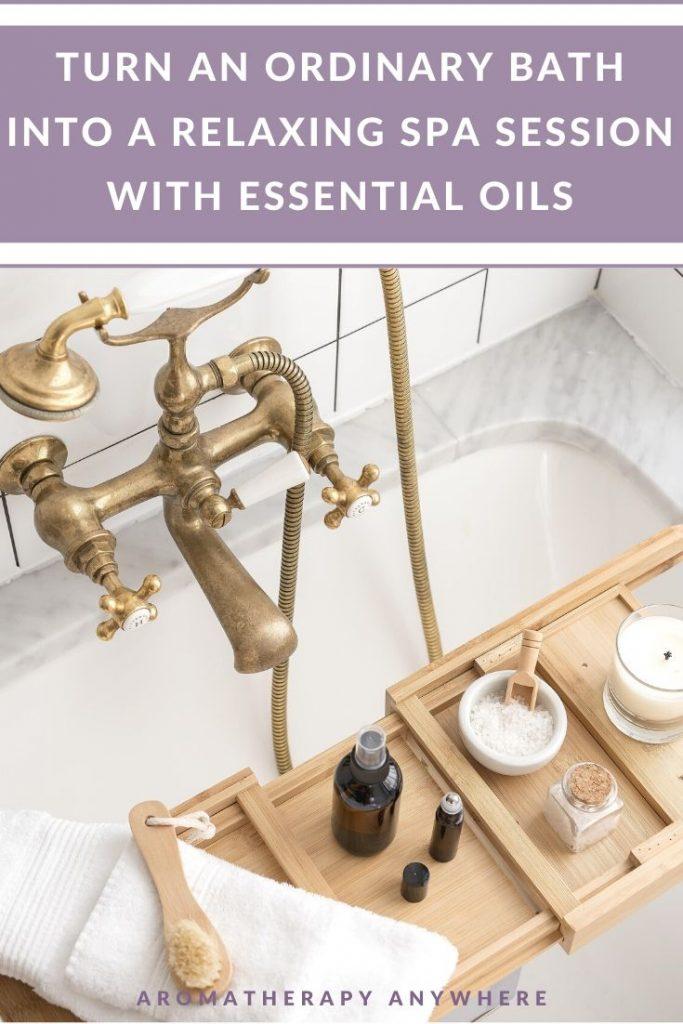
Disclaimer: This information is not intended to serve as medical advice. Please consult your doctor before using any natural medication or if you experience any unusual symptoms. See Full Disclaimer here.

